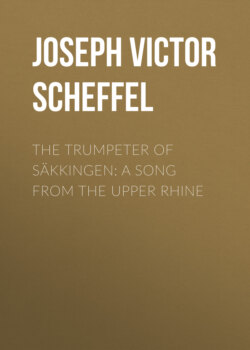Читать книгу The Trumpeter of Säkkingen: A Song from the Upper Rhine - Joseph Victor von Scheffel - Страница 3
DEDICATION.
Оглавление"Who is yonder light-haired stranger
Who there like a cat is roaming
O'er the roof of Don Pagano?"--
Thus asked many honest burghers,
Dwellers on the Isle of Capri,
When they from the market turning
Looked up at the palm-tree and the
Low-arched roof of moorish fashion.
And the worthy Don Pagano
Said: "That is a strange queer fellow,
And most strange his occupation.
Came here with but little luggage,
Lives here quite alone but happy,
Clambers up the steepest mountains,
Over cliffs, through surf is strolling,
Loves to steal along the sea-shore.
Also lately 'mid the ruins
Of the villa of Tiberius
With the hermits there caroused.
What's his business?--He's a German,
And who knows what they are doing?
But I saw upon his table
Heaps of paper written over,
Leaving very wasteful margins;
I believe he is half crazy,
I believe he's making verses."
Thus he spoke.--And I myself was
This queer stranger. Solitary
I had on this rocky island
Sung this song of my dear Schwarzwald.
I went as a wand'ring scholar
To far countries, to Italia;
With much art became acquainted,
Also with bad vetturinos,
And with many burning flea-bites;
But the sweet fruit of the lotus,
Which doth banish love of country
And the longing to return there,
I have never found here growing.
'Twas in Rome. Hard lay the winter
On th' eternal sev'n-hilled city:
Hard? for even Marcus Brutus
Would have caught a bad catarrh then;
And the rain seemed never-ending.
Like a dream then rose the vision
Of the Schwarzwald, and the story
Of the young musician Werner
And the lovely Margaretta.
In my youth I have stood often
By their graves close to the Rhine shore;
Many things which lie there buried
Are, however, long forgotten.
But like one to whom a sudden
Ringing in his ears betokens
That at home of him they're thinking,
So I heard young Werner's trumpet
Through the Roman Winter, through the
Carnival's gay flower-show--
Heard it from afar, then nearer,
Like the crystal which of vap'rous
Fine materials is condensing
And increases radiating;
So the figures of this song grew--
Even followed me to Naples.
In the halls of the Museum
Who should meet me but the Baron
Shaking his big cane and smiling,
And before Pompeii's gate sat
The black tom-cat Hiddigeigei.
Purring, quoth he: "Leave all study;
What is all this ancient rubbish,
E'en that dog there in mosaic
In the tragic Poet's dwelling,
In comparison with me--the
Epic type of all cat-nature?"
This I could no longer stand, so
Now began this ghost to banish.
From the brother of the lovely
Luisella, from the crooked
Cunning druggist of Sorrento
Quantities of ink I ordered,
And sailed o'er the bay to Capri.
Here began my exorcisms.
Many pale-gold coloured sea-fish,
Many lobsters, many oysters,
I ate up without compassion;
Drank the red wine like Tiberius,
Without mercy poetising;
On the roof went up and down till
All resounded metrically,
And the charm was then accomplished:
Chained up in four-measured trochees
Lay those figures which so long now
From my couch sweet sleep had banished.
'Twas high time, too; Spring already
Now gave signal of his coming--
Buds were sprouting on the fig-trees;
Shots were cracking, for with guns and
Nets they were the quails pursuing,
Who towards home their flight were taking;
And the minstrel was in peril
Then of seeing feathered colleagues
Set upon the table roasted.
This dread o'er him, pen and inkstand
Flew against the wall together.
Ready now and newly soled were
My strong boots which old Vesuvius
Had much damaged with his sulphur.
Farther now I journey onward.
Up, my good old Marinaro!
Off from land! the waves with pleasure
Bear light hearts and weightless freightage.
But the song, which with such happy
Spring-born feelings from my heart welled,
Bears my greetings to my country
And to you, my honoured parents.
Many faults are in it, truly:
Tragic pathos may be wanting,
And a racy tendance; also,
As in Amaranth, the fragrant
Incense of a pious soul, its
Sober but pretentious colouring.
Take him, as he is, this ruddy.
Rough, uncouth son of the mountains,
With a pine branch on his straw hat.
What he's wanting in, pray, cover
With the veil of kind indulgence.
Take him not as thanks, for always
In your Book of Love I'm debtor,
But as greeting and as witness,
That a man whom worldly fortune
Has not placed 'mid smiling verdure,
Yet can, happy as a lark pour
Out his song on leafless branches.
Capri, May 1st, 1853.
